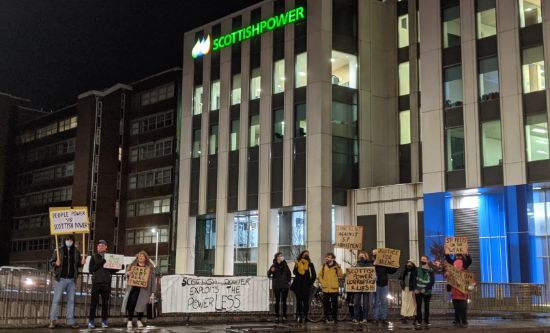
On 6 December 2021 members of the campaign group Living Rent protested inside the offices of Scottish Power in Glasgow to highlight the case of a disabled tenant who was hounded by debt collectors after Scottish Power billed her £1,500 for energy she hadn’t used. Meanwhile, the impact of the pandemic and the rising cost of living alongside falling incomes, particularly for the poorest sections of the working class, can be expected to increase the number of people in fuel poverty.
In 2001 the Scottish Government (then a Labour/Liberal Democrat coalition) set a target to eradicate fuel poverty by 2016. Successive governments stuck to this target. Yet the latest available figures, which are for 2019, show an estimated 24.6% (613,000) of households in Scotland are living in fuel poverty with 12.4% (or 311,000) in extreme fuel poverty.
Policies to tackle fuel poverty are minimal (such as the £140 Warm Home Discount) and are in essence another public subsidy to private companies. In October 2017 the Scottish National Party government promised that it would create a ‘publicly owned not for profit’ energy company by March 2021. This has not happened, and the ‘business case’ for it is still being discussed.
The Fuel Poverty (Targets, Definition and Strategy) (Scotland) Bill became law in July 2019. This redefined fuel poverty, laying greater emphasis on income rather than energy use, and set the new target that no more than 5% of households in Scotland should be in fuel poverty by 2040 (with no more than 1% in extreme fuel poverty). Based on the number of households in Scotland today (2,372,777 according to the 2021 census) this means that even in the unlikely event that this 5% target is reached, over 118,000 households would still be in fuel poverty. This in the context of climate change and a code red for humanity which capitalist politicians, serving multinational bosses, are just as determined not to address.
When the pandemic hit it was the lowest paid workers who were at greater risk of losing their jobs and likewise it is the poorest bearing the brunt of the hike in the cost of living, with those forced onto prepayment meters by energy companies paying a higher price for energy. On 1 October annual bills increased by £153 for prepayment customers to £1,309 per year, as compared to energy users allowed to pay by direct debit who saw an £139 increase to £1,277 per year. With yet another rise in the energy price cap set for April 2022 the situation will only get worse. Between April and September 2021 Trussell Trust foodbanks alone provided 84,555 emergency food parcels to households in Scotland.
It’s an ill wind…
Meanwhile, in the first six months of 2021, with colder weather and the pandemic, Britain’s biggest energy supplier British/Scottish Gas (owned by Centrica) doubled its profits to £172m compared to the same period in 2020. Made up of former bankers, such as the Oxford educated multi-millionaire Stephen Hester (chief executive of Royal Bank of Scotland 2008–2013), and ex-representatives of multinationals including Royal Dutch Shell, KPMG and Deloitte, the mansion-owning Centrica board members are clear: we are to be kept in cold homes while the planet burns.
And yet the results of the energy-saving renovation of three Glasgow tower blocks (314 homes) by the Queens Cross Housing Association homes at Cedar Court, in the Woodside area of Glasgow shows that it is technologically possible to address fuel poverty, while maintaining and improving housing stock and standards and fighting climate change. The blocks were fitted with improved low energy lighting, new insulation, modern controllable heating and hot water systems and triple-glazed windows, and as a result energy demand was slashed by 80% with one resident family claiming that they hadn’t had to put the heating on in two years!
As poor, working class people in Scotland face a winter of fuel poverty, we need more collective action on the streets and in our communities against the blood-sucking energy companies and the capitalist political system and state which defends them, to demand safe, decent, warm homes for all.
Dominic Mulgrew




